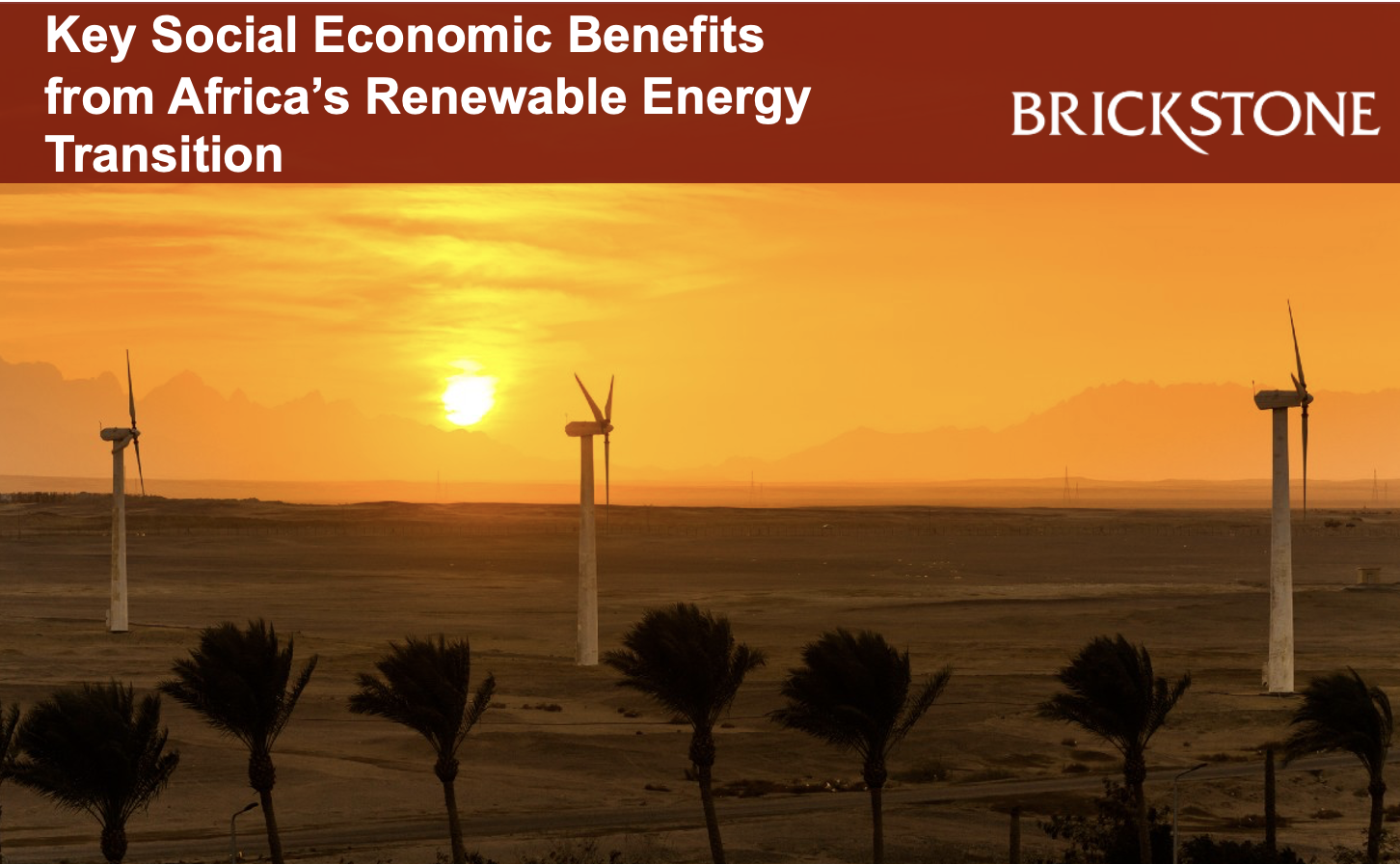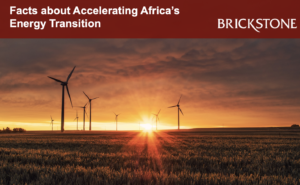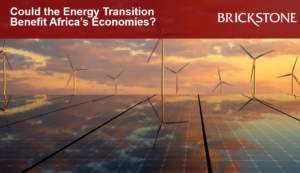Key Social Economic Benefits from Africa’s Renewable Energy Transition
Africa’s renewable energy transition is fundamental to the continent’s future as Africa is projected to be the home of 2 billion people by 2050. Eighty percent of them will live in Sub-Saharan Africa, where less than half of all people have access to electricity today, and as little as 16% have access to clean cooking fuels and technologies.
Meeting their needs with sustainable sources of modern energy – for consumption and production – will be essential to social welfare and economic development. According to WeForum, inclusive planning and consensus building will be vital for a successful clean energy transition for everyone.
This article by Brickstone Africa reviews publications on social economic benefits from Africa’s renewable energy transition.
Renewable Energy Sources in Africa
The African continent is rich in renewable energy sources, though many of them remain heavily underutilised until today. In a recent report, the International Renewable Energy Agency (IRENA) and the AfDB (African Development Bank) estimate the continent’s solar photovoltaic (PV) technical potential at 7,900 GW, suggesting Africa possesses some of the globe’s greatest potential for solar power generation. This is in addition to sizeable, additional potential for hydropower (1,753 GW), and wind energy (461 GW), as well as in some parts of Africa geothermal and modern bioenergy.
For many African energy importers, renewable energy holds great potential to reduce vulnerability to the external shocks caused by movements in the price of fossil fuels. Renewables can also play a central role in creating jobs and improving welfare.
In addition to being environment- and climate-friendly, and often highly cost-effective compared to the long-run costs of imported oil and natural gas, renewable energy also holds large potential for wider significant socio-economic benefits in Africa.
Impact of 1.5-S Pathway on Africa’s GDP
The energy transition under IRENA’s 1.5-S pathway, which measures the socio-economic outcomes under an energy scenario conform with the Paris Agreement, boosts Africa’s GDP throughout the entire outlook period up to 2050, compared with a planned policies scenario (PES). Accordingly, on average, GDP is 7.5% higher in the first decade, and 6.4% higher over the nearly three decades until 2050.
Renewable energy will play a critical role in closing Africa’s energy access gap, which remains a massive obstacle to advancing socio-economic and human development continent-wide.
Much of this growth stems from the role the energy transition plays to boost demand for new product ranges and services, and to promote innovation in new technologies and knowledge-based products, thereby also generating jobs.
While fossil fuel industries (coal, oil and natural gas) stand to lose under the energy transition, African economies can leverage on domestic strengths, increasingly addressing the value chain of manufacturing through domestic industrialisation. Education and training opportunities help build the basis for this development.
Also, by driving the development of new industries, the energy transition can also become a major job creation opportunity for Africa. IRENA’s analysis shows that renewables and other energy transition–related technologies have already created 1.9 million jobs across Africa, a number that will grow substantially as countries invest further in the energy transition.
Under the 1.5-S pathway, economywide employment on the continent is 3.8% higher in 2030, and 3.6% higher in 2050, than under PES. Overall, the energy transition has the potential to create more than 9 million additional jobs between 2019 and 2030, and an additional 3 million jobs by 2050.
Ripple effects of transition-related economic changes mean many new jobs are created across sectors and beyond energy. This is particularly important, since the African Development Bank (AfDB) estimates that each year more than 10 million youth enter the workforce in Africa, yet only 3 million new jobs per year are currently created.
Another important effect of the energy transition on Africa is its massive impact on welfare. IRENA quantifies the impact of the energy transition through its Welfare Index, which captures different dimensions of welfare beyond just economic growth and job creation. Both in absolute terms, and measured through percentage differences among the scenarios, the global transition away from fossil fuels leaves people better off in Africa.
The benefits go beyond universal access to energy and vast reduction of climate change-related damages. The transition massively improves public health through reduced air pollution, generates distributional benefits, and thus reduces inequality.
The welfare improvement for the African continent under 1.5C-S over PES reaches 24.3% by 2050, ranging from 14.6% in North Africa to 39.6% in Southern Africa.
Proactive Policy in Africa’s Renewable Energy Transition
The enormous potential of the energy transition’s wide socio-economic benefits including in Africa lies on the assumption that proactive energy transition policies focused on generating these benefits are put in place. Many of these policies are already known and discussed; investment in, and promotion of education and training in modern sciences and technology; good governance, creating alternative social safety nets that protect the poor and help them access health, education, and modern energy in order to help themselves. It is also important for governments to create incentives for business, including an attractive investment climate, including in the energy sector.
Read more here.







